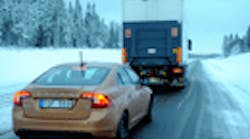Volvo Trucks has successfully completed a first test of a new road-safety concept called “vehicle platooning” at its proving grounds in Gothenburg, Sweden. The demonstration is part of the European Union-financed SARTRE project. SARTRE, which stands for Safe Road Trains for the Environment, is being led by Ricardo UK and includes participation from a number of companies, including Volvo Trucks, Volvo Car Corp. and Volvo Technology of Sweden.
The purpose of the project is to demonstrate that a “platoon” (or convoy) of vehicles led by professional driver in a lead vehicle can be closely—and safely-- followed by several cars. Each car measures the distance, speed and direction and adjusts to the car in front.
All the vehicles are totally detached from one another and can leave the convoy at any time. But while “platooned,” drivers can relax and perform other tasks as the convoy proceeds towards its distant destination.
According to the EU, platooning could be a safe r way to travel by road in as little as ten year’s time.
“SARTRE is a very exciting project with future potential for saving fuel and improving traffic safety,” said Carl Johan Almqvist, traffic & product safety director at Volvo Trucks.
Volvo Truck’s testing included a lead truck and a single car circling the company’s ‘country road’ test track section.
“This is a major milestone for this important European research program,” said Tom Robinson, from Ricardo UK and the project coordinator for SARTRE. “Platooning offers the prospect of improved road safety, better road space utilization, improved driver comfort on long journeys as well as reduced fuel consumption and hence lower CO2 emissions.
“With the combined skills of its participating companies,” he added, “ SARTRE is making tangible progress towards the realization of safe and effective road train technology.”
The purpose of the demonstration, in addition to showing how platooning works, was also to highlight its safety and environmental benefits.
“A professional, well-trained driver leading the road train is an important factor to ensure safety in the project,” said Erik Nordin of Volvo Technology.
According to the participants, road safety would be enhanced as nearly 80% of all accidents are the result of human behaviour. By taking control away from drivers in the platoon, safety should theoretically improve. Also, fuel consumption and CO2 emissions would decline 20% for vehicles in the platoon.
It also would free up drivers’ time in the cars inside the platoon, allowing them to perform other tasks without putting themselves or others at risk.
“Volvo Technology is also working on the development and installation of different types of aids that will further increase traffic safety,” said Nordin.
The Volvo truck leading this platoon test was a 6x2 FH rigid with 13-liter engine and all the latest safety features, including Volvo’s electronic stability program, lane keeping support, driver alert support, lane change support, and adaptive cruise control.



